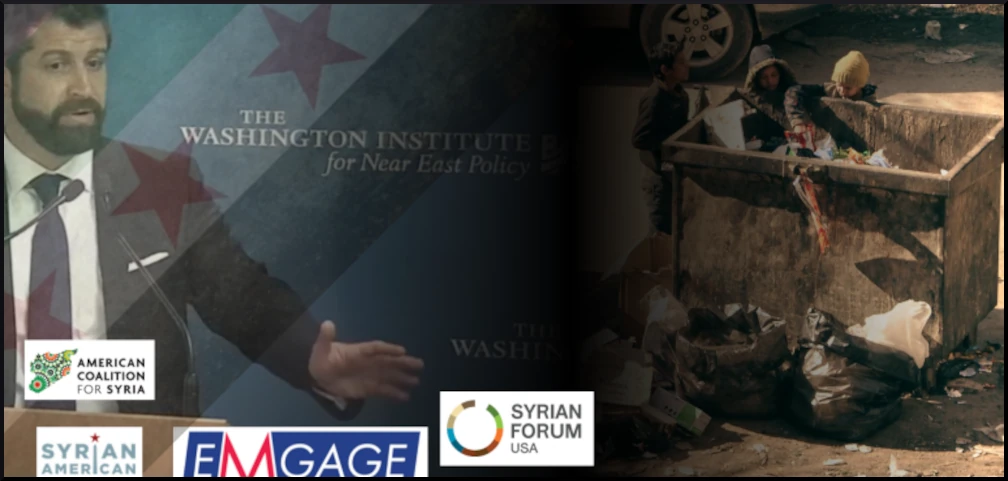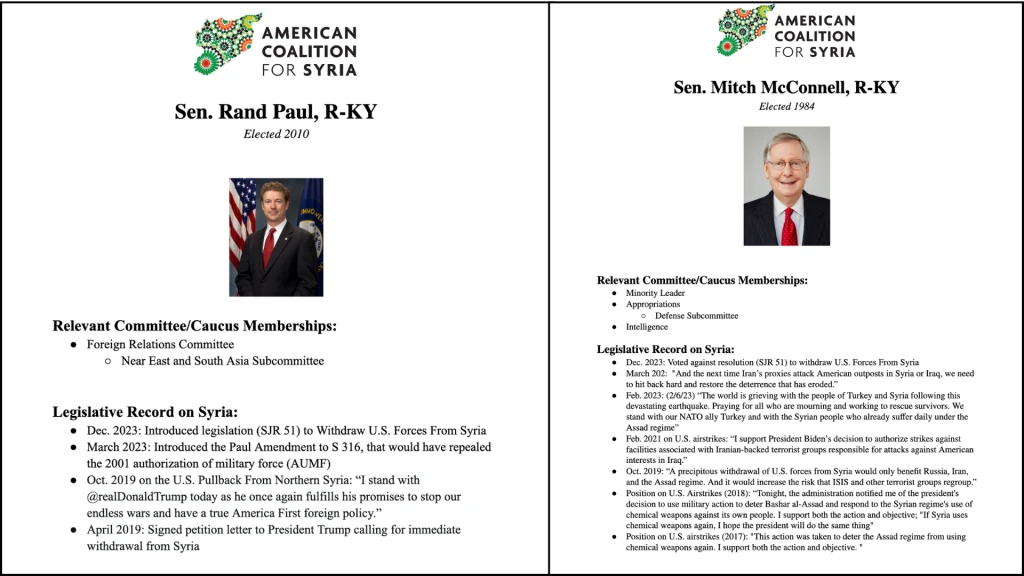by Hekmat Aboukhater, published on The Grayzone, March 20, 2024
A week from the 13th anniversary of the US-backed Syrian dirty war, the American Coalition for Syria held its annual day of advocacy in Washington DC. I went undercover into meetings with Senate policy advisors and witnessed the lobby’s cynical campaign to starve Syria into submission.
On the morning of March 7, as the US Capitol teemed with lobbyists securing earmarks ahead of appropriations week and activists decrying the Gaza genocide, one special interest group on the Hill stood out. In the corridors of the Rayburn building, a group of roughly 50 people prepared for a busy day of advocating for sanctions to be levied against their homeland.
They were the Anti-Syria lobby — and I had infiltrated their influence campaign.
Throughout the day, I watched as this group pushed US officials to accept their policy of starvation sanctions while cynically ignoring famished Palestinians in Gaza.
Among the lobbyists was Raed Saleh, the head of the Syrian White Helmets, who were to propagandize for regime change from behind humanitarian cover.
I attended a total of seven meetings with policy teams representing Senators Sherrod Brown, Maggie Hassan, Ben Cardin, Mark Kelly, Chris Van Hollen, John Fetterman, and Rick Scott. Throughout these sessions, I witnessed the anti-Syria Lobby attempt to bully and manipulate US officials into accepting their policy of starvation while cynically throwing starving Palestinians in Gaza under the bus.
At one moment, Raed Saleh, head of the Syrian White Helmets, which was founded by British intelligence, and funded by NATO states, painted Israeli air strikes against Syria in a positive light.
During a separate meeting, Wa’el Alzayat of the pro-Zionist Muslim outreach Emgage even demanded Senator Chris Van Hollen’s office support the approval of aid for Al Qaeda-linked militias in Syria.
“Stop freaking out about the stuff going to terrorists,” he insisted, adding that “the Brits are doing it, the Turks are doing it, [and] the Qataris are doing it.”
Purporting to be a voice for all Syrians, the anti-Syria lobby is spearheaded by the American Coalition for Syria (ACS), an umbrella organization representing opposition groups such as the Syrian American Council (SAC), the Syrian Forum, and a handful of others located in the US and Turkey.
Emgage, meanwhile, has been credited with getting the diaspora vote out for then-candidate Joe Biden in November 2020. The group has since fallen under criticism for acting as a de facto extension of the Biden White House and Democratic Party within the Muslim community. Emgage board member Farooq Mitha formally went to work for the Biden Pentagon in March 2021. On March 7, Alzayat aimed to weaponize Emgage’s influence against Democratic Senators who seemed uncomfortable with an escalating sanctions policy.
“I need a good story for my voters,” he explained to Senator Van Hollen’s team.
Throughout their sanctions campaign on the Hill, Alzayat and his cohorts operated like a miniature version of their Israel lobby allies, supplying roughly 50 volunteers with folders outlining talking points and the biographies of congressional representatives. The bios included a comprehensive list of the Senator or Representative’s recorded stance on Syria, such as their votes on the extension of the AUMF, the US military withdrawal from Syria, and previous sanctions packages targeting the country.
The handouts also laid out the lobby’s key legislative requests, which largely focused on securing development aid for militia-controlled territory in Syria — including that held by Al Qaeda’s local ally in the country — and ensuring passage of the ‘Assad Regime Anti Normalization Bill,’ which seeks to extend and expand sanctions targeting Damascus.
The Anti-Syria Lobby’s resemblance to their Israeli counterparts was no mistake. As Republican Florida Sen. Rick Scott’s chief of staff reassured us, “the Israelis want you guys in charge.”
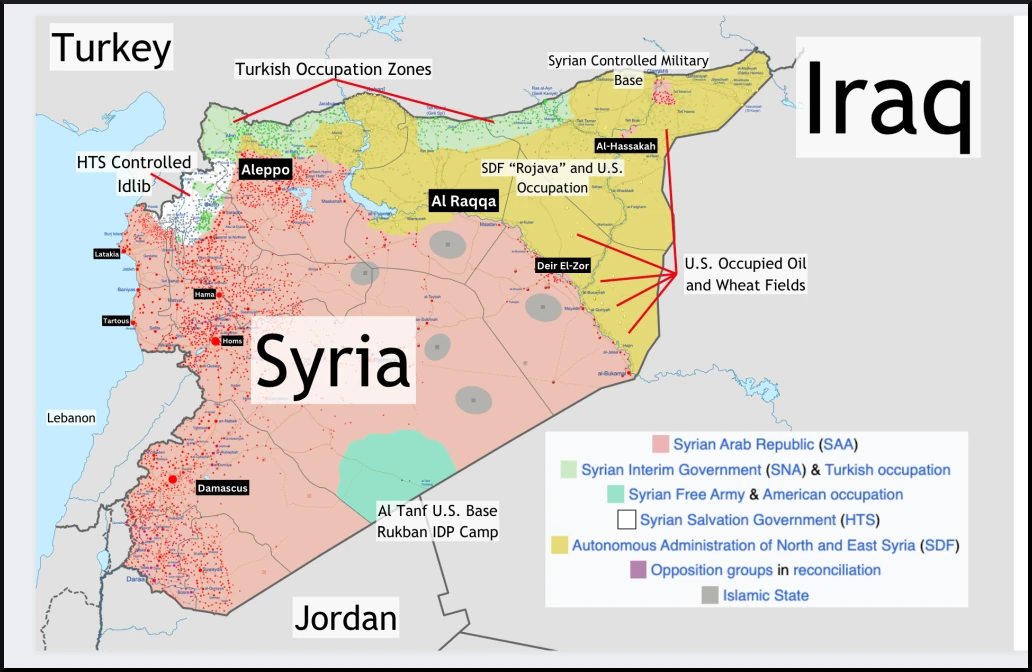
More Starvation Sanctions
Ever since the US included Syria on its inaugural State Sponsor of Terrorism (SST) list over Damascus’ support for the Palestinian resistance in 1979, Washington has gradually ratcheted up its financial war on the Syrian people. When decades of covert hybrid war erupted into an all-out proxy battle for the country’s territory—and survival—in 2011, the Anti-Syria Lobby officially began to take shape in Washington.

In 2019, as Syria’s government emerged victorious from a multi-year battle with foreign-backed militias, Washington decided that while Damascus may have won the war, it would not win the peace. That January, New York Rep. Eliot Engel, a recipient of $1.8 million in AIPAC donations, introduced a sanctions package known as the Caesar Syria Civilian Protection Act. Trump signed the bill as part of the National Defence Authorization Act (NDAA) of 2020.
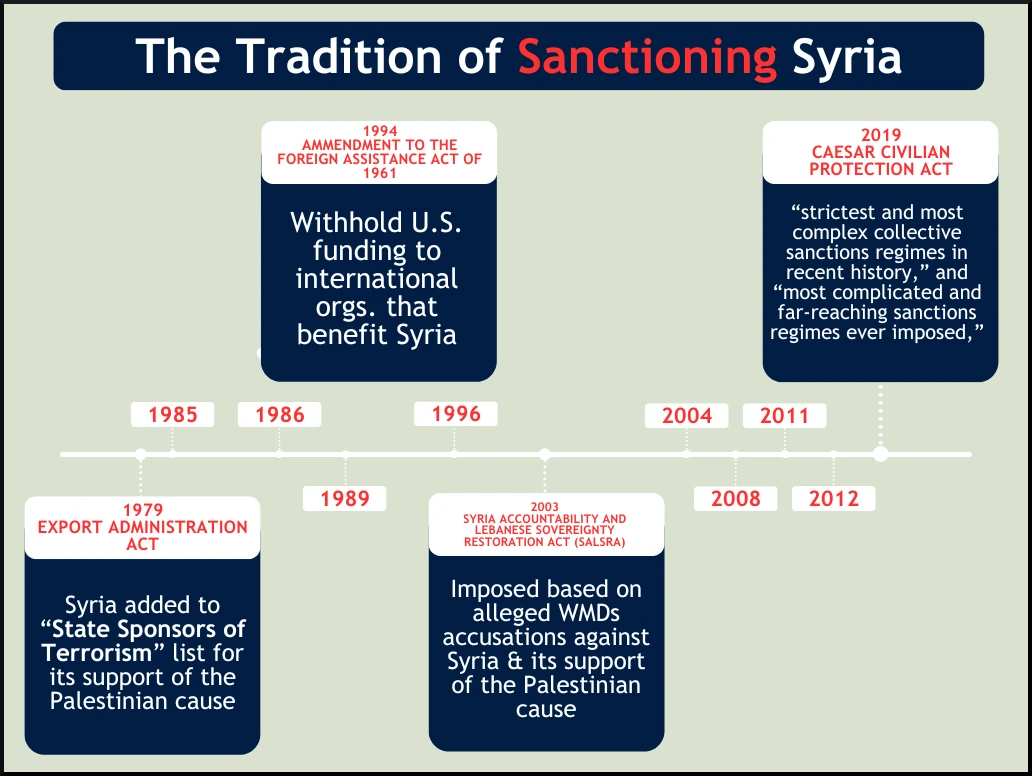
The bill was unprecedented in both the way that it sanctioned broad sectors of the Syrian economy rather than only specific individuals, and in its deployment of so-called “secondary sanctions.” Secondary sanctions are imposed on parties that do business with a sanctioned entity even if those exchanges occur outside of the sanctioning entity’s jurisdiction.
Syria’s economy has been in free fall ever since the Caesar sanctions came into effect. Today, over 12 million Syrians representing more than half of the total population face food insecurity — a 51% increase from 2019. Meanwhile, 90 percent of the population lives under the poverty line. In 2019, the US dollar exchanged for 500 Syrian Pounds. Today, that number is more like 14,100— figures that represent a 2,720 percent devaluation.
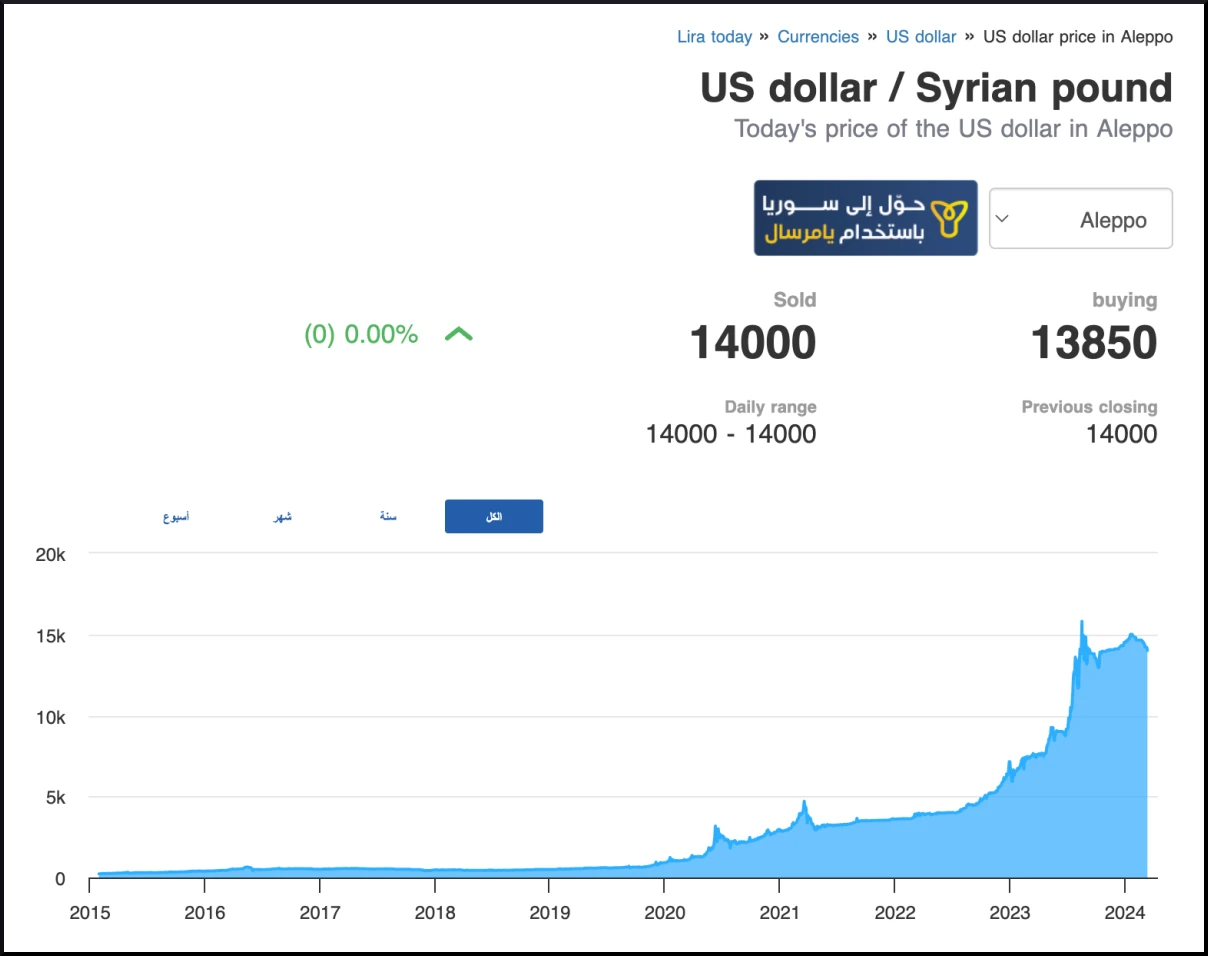
Though H.R. 3202 appears to be focused on addressing UN aid divergence, and sanctioning previously unsanctioned entities like Asma Al Assad’s Syria Trust for Development and the Syrian Red Crescent, the real agenda of the bill is found deep within its 22-page text.
With the Caesar Sanctions set to expire by the end of 2024, H.R. 3202 seeks to quietly extend the aggressive financial measures until 2032.
 Having passed the House with overwhelming enthusiasm, H.R. 3202’s sister bill in the Senate can only pass with Democratic support. It was introduced by Israeli lobby-funded Republican Idaho Sen. James Risch last September and has since been co-sponsored by arch-neoconservative Florida Sen. Marco Rubio.
Having passed the House with overwhelming enthusiasm, H.R. 3202’s sister bill in the Senate can only pass with Democratic support. It was introduced by Israeli lobby-funded Republican Idaho Sen. James Risch last September and has since been co-sponsored by arch-neoconservative Florida Sen. Marco Rubio.
Because S. 2935 can only pass with Democratic sponsorship, the Anti-Syria Lobby chose Sen. Ben Cardin, the Chairman of the Senate Foreign Relations Committee and sponsor of the anti-Russia Magnitsky Act, as a crucial target for influence.
After meeting with Sherrod Brown’s office, Cardin’s Research and Legislative Assistant, Christopher Barr, hosted us in the Senator’s office. There, Raed Saleh of the White Helmets complained to Barr that USAID had slashed funding for his organization from $12 million to $3 million in recent years.
Next, it was time to discuss the true purpose of our visit: the passage of S. 2935.
Barr appeared uneasy from the outset and even expressed displeasure about the bill, complaining, “What passed the House was kind of a lot… the list of targets is vast.”
“Syria has already been so heavily sanctioned,” he added.
In response, Ghanem revealed a critical piece of information about the forces driving the dirty war on Syria, explaining that the impetus to expand and extend Caesar did not come from the Anti-Syria Lobby itself, but someone on Capitol Hill. Ghanem explained that the Hill source actually contacted the American Coalition for Syria to alert them to the fact that Caesar was set to expire, lamenting the fact that its sunset would amount to a loss of “US leverage over the Syrian regime.”
This line echoed the disturbing language of officials representing both the Biden and Trump administration alike. In 2019, neoconservative operative Dana Stroul declared that thanks to Caesar, Washington “holds a card on preventing reconstruction aid and technical expertise from going back,” to Syria. She lauded the fact that the US could weaponize that “leverage” to keep Syria in “rubble.” Two years later, she would take up post as Deputy Secretary of Defense for the Middle East under Biden.
Joe Biden’s pick to lead the Pentagon’s Middle East Desk: Dana Stroul
She claims the US ‘owns’ the most hydrocarbon & grain-rich one-third of Syria
and that the US will use it as leverage to pursue regime change.
She also indicates the US will block reconstruction funding pic.twitter.com/DgHdFATa2U
— Going Underground (@GUnderground_TV) January 28, 2021
Similarly, during an event at the neoconservative think tank, WINEP, the following year, the Special Envoy for Syria under Trump, Joel Rayburn, boasted that Caesar “lowers the bar” for evidence-based sanctions and allows for the broad targeting of any and all reconstruction projects in Syria.
As a top official in Trump’s State (aka Sadist) Department, it was DC resident @joel_rayburn‘s job to implement murderous sanctions that intentionally deprive Syrians of basic goods and prevent their war-torn country’s reconstruction. This is something he openly celebrated. https://t.co/mxv2WshoEV
— Aaron Maté (@aaronjmate) September 28, 2021
“We don’t have to prove, for example, that a company that’s going in to do a reconstruction project in the Damascus region is dealing directly with the Assad regime,” Rayburn explained.
“We don’t have to have the evidence to prove that link,” he continued. “We just have to have the evidence that proves that a company or an individual is investing in […] the construction sector, the engineering sector, most of the aviation sector, the finance sector, energy sector, and so on.”
These public confessions did not stop the Anti-Syria Lobby from lying to the faces of congressional staffers throughout their March 7 campaign.
During a meeting with Sen. Mark Kelly’s office, Mohammed Alaa Ghanem, the top lobbyist for the pro-war Syrian American Council, falsely stated that the Caesar Sanctions were “targeted,” “not sectoral,” and “not [an] embargo, nothing punishing to civilians.”
However, Alena Douhan, the UN Special Rapporteur on Sanctions who visited Syria to document the effects of Washington’s unilateral sanctions regime on Syria, disagreed. In her 19-page report she clearly states that the sanctions are both illegal and inhumane in the way they affect the average Syrian.
Stabilization for me but not for thee
The second legislative ask came in the form of a well rehearsed speech by Ghanem, Zayat, and others, outlining what US tax dollars do and don’t fund in Syria. US aid packages are typically divided into two categories: “humanitarian funding” earmarked for goods such as food, water, and basic medical supplies or “stabilization” funding designed to secure a country as it transitions out of a period of turmoil. Unlike humanitarian assistance, stabilization funding may be used to support major investment and infrastructure projects such as roads, schools, healthcare facilities, and government services.
The US is the primary funder of humanitarian aid in both North East (NE) and NW Syria. However, while the US spends abundantly on stabilization needs in NE Syria, it spends $0 on the NW. That is because while Washington has long dreamed of establishing a secessionist Kurdish state in Syria’s Northeast, it neglected to send stabilization funds to the Northwest in order to avoid providing direct support to HTS, the Al Qaeda offshoot that governs the territory. The Anti-Syria Lobby was in Washington to change that.
Leading the push for US funds to Al Qaeda-affiliated elements in Northwest Syria was Wa’el Alzayat, a Syrian expat who proudly served in Iraq’s Green Zone under George Bush’s State Department and more recently published a shocking Washington Post oped begging US officials not to “lift sanctions to help Syria earthquake victims.” In the office of Sen. Chris Van Hollen, Alzayat voiced his frustration with US hesitation in the Northwest.
“Stop freaking out about the stuff going to terrorists,” he demanded, adding that “the Brits are doing it, the Turks are doing it, the Qataris are doing it.”
We’re missing out on a golden opportunity here to stabilize the region and leverage it for a political settlement,” he pleaded. In other words, Alzayat was openly lobbying US officials to strengthen Al Qaeda’s position in Syria in order to leverage the terrorist group against the country’s government.
Alzayat then weaponized his six-figure salary as head of Emgage to bully Van Hollen’s office into bowing before the anti-Syria Lobby, falsely claiming that his AIPAC-linked organization was “behind” the “Uncommitted” vote campaigns that damaged Biden’s primary performance in Michigan and Minnesota.
Towards the end of the meeting, the regime change lobbyist cynically invoked Israel’s slaughter of 30,000 Palestinians in Gaza to make the case for Al Qaeda in Syria one last time.
He argued that although “his community” is up in arms about the Biden administration’s funding and arming of the Gaza genocide, they would gladly flock back to the Democratic Party if the US funded roads and schools in Al Qaeda-controlled Idlib.
“I need a good story for my voters,” Alzayat explained, noting the Muslim community’s disapproval of the Biden Administration’s policy in Gaza and Yemen.
“You’re upset about all these disappointments,” he continued, play-acting a scenario in which he convinced a Muslim constituent to vote for Biden, again. “Guess what? They’re pumping 50 million into the school sector in the North [of Syria]!”
Overtures Towards Israel
The Israel-Palestine crisis loomed large throughout the ACS lobbying trip. Sen. Sherrod Brown’s secretary happened to be a hijabi Muslim woman sporting a pendant outlining the map of Palestine around her neck. As she greeted us, Farouk Belal, the head of the Syrian American Council, grumbled to Ghanem and me: “I hope she’s not with the resistance.”
When I asked him to clarify what he meant as we exited the office, he explained that people aligned with the Palestinian cause in Washington “don’t like us.”
Meanwhile, in Sen. Cardin’s office, Raed Salah of the White Helmets painted Israeli strikes on Syria which have crippled Syrian infrastructure, regularly damaged the country’s International civilian airports, and killed hundreds of Syrian Soldiers and civilians alike in a positive light:
“The situation in Syria is very complicated. Every day we hear of Israeli strikes on the dens, or the bases of the IRGC and its militias. Even we as Syrians did not know the extent to which the Iranians were entrenched in the country…”
For Saleh, the Israeli strikes do nothing but highlight the presence of the Syrian government-invited Iranian military in Syria.
Later that day, Ghanem attempted to capitalize on Sen. Fetterman’s fanatical pro-Israel antics by describing recent developments in Syria to a 20-something staffer. Referring to the Syrian government’s successful campaign to retake southern territory, he explained that the South is “where they lob missiles on Israel, by the way.” The aide dutifully transcribed this seemingly random piece of information in her notepad. Towards the end of the meeting, Fetterman was discussed as a potential Democratic sponsor of S. 2935 in the Senate.
In Senator Rick Scott’s office, a Cuban American Government Relations Associate for ACS, Alberto Hernandez, accidentally said the quiet part out loud. When Senator Scott’s ultra-Zionist National Security Advisor, Paul Bonicelli, asked if our group had connected with our “counterparts” in the Israeli lobby so that they could “vet” our proposals — revealing that Scott has apparently outsourced his brain to Zionists — Hernandez remarked: “Formally? No. Informally.”
He then turned to the rest of the ACS team in the meeting room and said: “You didn’t hear me say that.”
That admission prompted Bonicelli to suggest that ACS directly coordinate with groups such as the Aramaic Church in Israel, which has supported regime change efforts in Damascus despite overwhelming Christian support of the government within Syria itself.
As the meeting wound to a close, Bonicelli informed us that he agreed with ACS on the necessity to oppose Iran and Russia.
“If Obama had done the right thing in 2012, we wouldn’t be here,” he lamented, adding: “the Israelis want you guys in charge.”
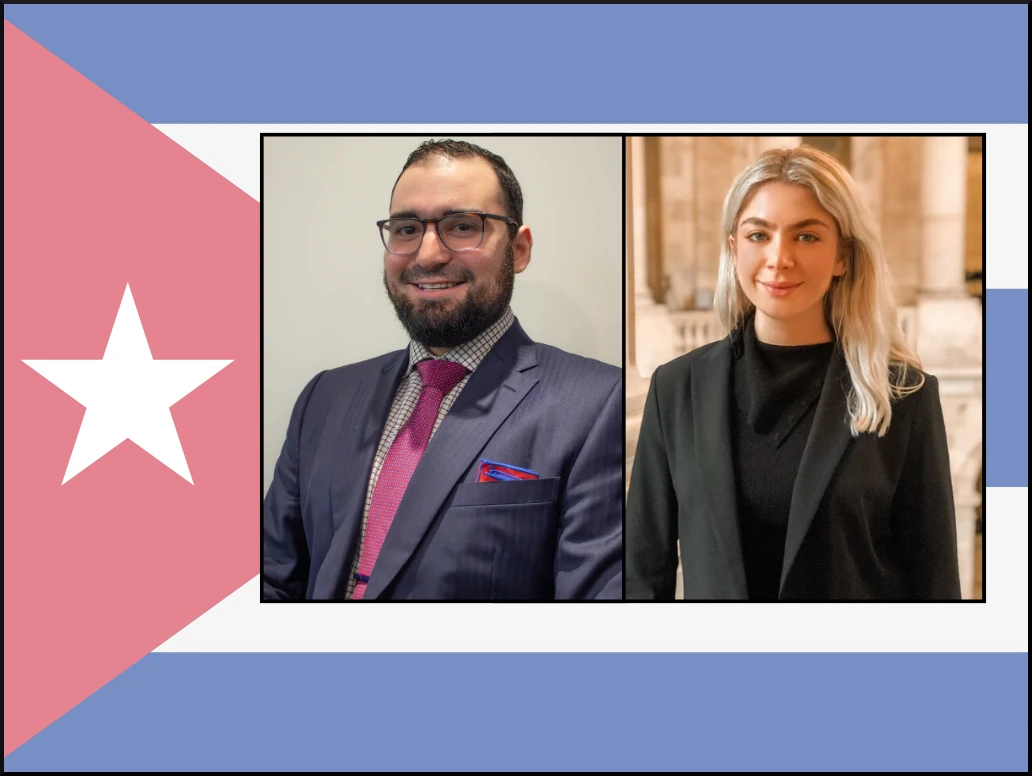
Starving Syrians Without A Mandate
Though several ACS volunteers shared painful personal encounters with the Syrian government throughout the day, many were simply too far removed from Syria to truly represent the voice of Syrian people, especially the 12 million plus civilians currently living in Syrian government-controlled territory.
One 24-year-old woman who did not speak Arabic and has not been to Syria since 2003 described the Syrian Army’s 2016 liberation of Aleppo from Al Qaeda-linked militants as “the fall of Aleppo.”
Other Syrians like myself experienced the terror of the West’s proxy war in Syria firsthand. In 2012, my aunt and cousins watched in horror as the Turkish-backed Liwa’ Al Tawhid, an umbrella group of takfiri jihadist militias, arrived on their street in the Seryan El Jdideh neighborhood of Aleppo. The militants proceeded to execute a local pick-up truck driver and steal his vehicle, leaving his bleeding corpse on the street. Shahba, where my family lived up until 2015, was located just a stone’s throw away from these sectarian death squads during our final months there.
The Syrian dirty war was bloody and gruesome, yet the picture that ACS paints is entirely one-sided. Unfortunately, while organizations like ACS have flocked to the Beltway swamp throughout the last 13 years, there are no Syrians present in Washington DC to counter them. While these groups claim to speak on behalf of the Syrian people, those of us who have lived and still live in areas controlled by Syrian government — regardless of our political affiliations—are rendered voiceless in the very center of power where our perspective should matter most. Even Syria’s embassy has been shuttered since 2014, while Syrian diplomats at the UN in New York are heavily monitored and restricted from traveling beyond the NYC metro area.
As I witnessed on Capitol Hill, there are few obstacles to the anti-Syria lobby’s ruthless push to prevent the majority of Syrians from emerging from the ruins of war.
Hekmat Aboukhater is a Syrian American journalist reporting from France, the US, and Syria. Hekmat hosts the WhatTheHekmat Podcast and the Conversations With Dissidents show. Follow him on Twitter at @WhatTheHekmat
 Syria Support Movement solidarity with the Syrian people
Syria Support Movement solidarity with the Syrian people

